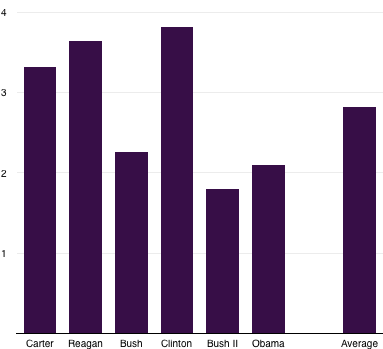Economy Base Level
We are, no doubt, about to be barraged by a torrent of alternative facts concerning the economy and economic growth under our new leader. So let’s get a few facts on the table in order to set a base level for future reference. Let’s start with growth during the past six presidencies:

So, no, Obama was not the disaster Trump and the Republicans are trying to paint him as. The economy during Obama’s term outperformed that of his predecessor. This includes the enormous difficulty of digging out of the Great Recession without much help from Congress.
Average growth through all that last six presidencies is around 2.8% a year, so boosting it to, and then maintaining it at, the 4.0% promised by Trump will take some extraordinary efforts, not to mention a defiance of history and is thus unlikely to occur.
More likely Trump will benefit from the current relatively good pace of growth, and then be able to add a little to it by introducing some deficit spending related to infrastructure. We must, though, be cautious about making that forecast: as of now we have no idea what team Trump has in store for us. We do know that the Republicans have, since Reagan, opposed infrastructure spending financed by increasing the Federal deficit. They had no problem blowing a hole in the Federal budget under Reagan — we all recall Dick Cheney telling us that, in his words: “deficits don’t matter” — but since the rise of the Tea Party the GOP has been dominated by a austerity hawk policy bias that has stymied any attempt to boost growth using government spending.
Given this, I imagine growth will accelerate this year — the economy has healed well even if the distribution of all this newfound prosperity is appallingly distributed — so look for GDP growth of about 3%. Next year it could be higher if Trump gets some sort of deficit spending through Congress. But after that I doubt this higher pace could be maintained, and I would expect GDOP to slide back towards the slower pattern of recent years.
I am only mentioning any of this so we can be clear about the facts and the base from which we are about to start. Presidents have remarkably little direct impact on the course of the economy so I am leery of associating growth with presidencies in principle. The policies of earlier presidents have a nasty habit of echoing in unexpected ways through time. Reagan, for instance, is responsible for the rapid uptake of the anti-social policy making that was carried on by Clinton. And the awful switch in corporate activity towards the pre-eminence of shareholder value as a key metric of management success was clearly a product of the neoliberal shift Reagan’s election heralded. He did not advocate such corporate behavior, but he undoubtedly set the stage for it. And history has shown that his administration marks the beginning of the slide in standards for the middle class and especially for workers in the lower income strata. Reagan himself, in terms of policies, may not have been responsible for that slide, but there is no doubt his ideological leadership was.
The question for us is, then, does Trump’s election mark the beginning of a new era and the rejection of the past forty years? Or is it simply an interlude dominated by a series of futile and short lived injections of energy that will rapidly dissipate and leave the economy basically unchanged? Will he tackle inequality? I doubt it. Will he introduce institutional changes to deal with the asymmetries of risk piled upon the shoulders of workers by the corporate led changes in the nature of work? Maybe, but that assumes he understands those changes. The evidence for that is thin: he looks very much like an old fashioned pro-business trickle down plutocrat. So don’t expect much other than lot of hoopla, fanfare, and then not much else.
Let’s hope I am wrong, our workers need all the help they can get, but there’s no sign of Trump being their savior. His administration is packed with other plutocrats whose basic understanding of the how we arrived where we are is, to put it politely, next to zero. The next few years are more likely to be a cloud of dust than a step forward. And the bigger risks — such as mismanagement — are on the downside not the upside.
Caveat emptor.